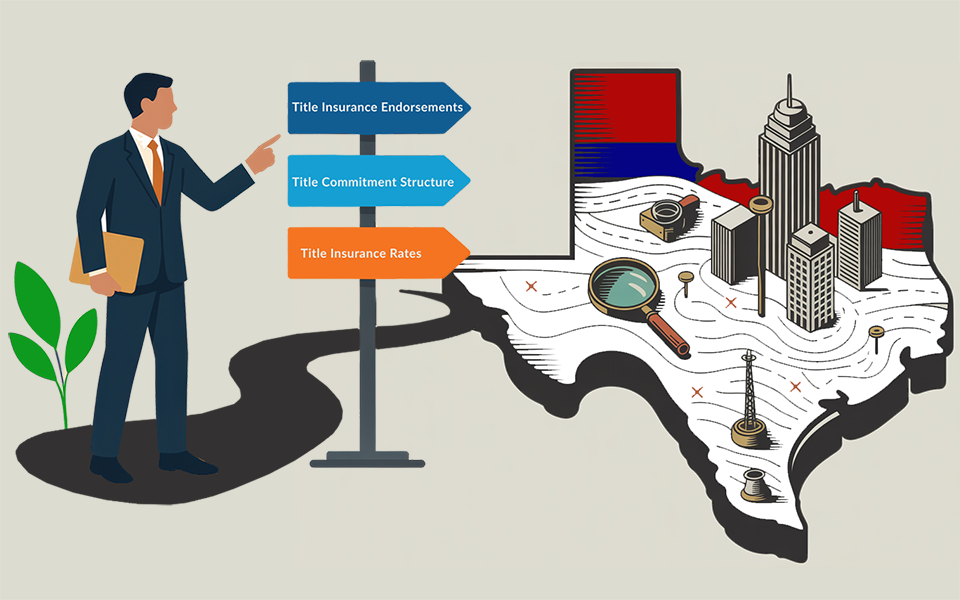December 22, 2025
Beyond the Standard Search: Advanced Commercial Title Due Diligence in Florida

I. Introduction
Last month in South Florida, a seasoned commercial real estate investor nearly walked away from a $12 million mixed-use development purchase. It wasn't because of the property's financials or its condition – both were solid. The deal almost fell apart because nobody had spotted a complex web of reciprocal easement agreements that severely restricted the planned renovation of the property. Fortunately, the title team caught these issues during an enhanced due diligence review, and a solution was negotiated. But it served as a wake-up call for everyone involved in commercial real estate transactions.
The rapid growth of Florida's commercial real estate market has made thorough title due diligence more critical than ever. Standard title searches – while essential – sometimes barely scratch the surface of what's needed in complex commercial transactions. The stakes are simply too high to rely on basic title work alone.
When dealing with a multi-million-dollar commercial property in today's market, buyers aren't just purchasing a building. They're inheriting decades of history, layers of rights and restrictions, and a web of interconnected interests that can make or break an investment. A missing easement, an overlooked use restriction, or an improperly verified entity chain of title can turn today's prime investment into tomorrow's legal nightmare.
This article delves into the critical aspects of commercial property title due diligence that go beyond the basics. Whether you're a real estate attorney looking to shore up your due diligence protocol, a commercial investor wanting to better understand the process, or a title professional seeking to expand your expertise, you'll find practical insights to help navigate the complexities of commercial title examination.
II. Standard Due Diligence vs. Enhanced Investigation
A. Review of Basic Components
Every commercial title search begins with the fundamentals. A standard examination typically includes a review of the public records for documents affecting title, tax information, and basic corporate documentation. This initial layer includes verification of the vesting deed, mortgage history, liens, and obvious encumbrances. For straightforward commercial transactions, these basic components might suffice.
A conventional title commitment will reveal:
• Chain of title going back at least 30 years
• Open mortgages and municipal liens
• Recorded easements
B. Why Basic Due Diligence May Fall Short
However, Florida's complex commercial real estate landscape demands a more thorough approach. Take, for example, a recent transaction in Tampa's bustling downtown district. What appeared to be a straightforward office building purchase revealed multiple underlying issues that only surfaced during enhanced due diligence. The property, which had been assembled from three separate parcels in the 1980s, carried forward several restrictions that weren't immediately apparent in the basic title work.
Enhanced investigation becomes crucial when dealing with:
Complex Ownership Structures: Contemporary commercial properties often involve intricate ownership arrangements. From multi-member LLCs to foreign corporations, each structure presents unique verification challenges. A surface-level review might miss crucial details about authority requirements or ownership transfers buried in complex corporate documents.
Multiple-Parcel Transactions: Many of Florida's commercial developments span multiple parcels, each with its own history. These properties require careful examination of unity of title issues, access rights between parcels, and shared facility agreements. A basic search might not capture the nuanced relationships between these parcels, particularly when they've been assembled over time.
Historical Use Considerations: In rapidly developing areas like Miami-Dade or Orlando, property usage has evolved significantly over the decades. Former industrial sites converted to retail spaces, or old residential areas transformed into commercial zones, often carry forward historical restrictions or requirements that can impact current use and future development.
Multi-jurisdictional Issues: Large commercial properties may cross municipal boundaries or special districts, each with its own regulations and restrictions. Standard title searches might not fully capture these jurisdictional complexities, especially when it comes to development rights, impact fees, or special assessments.
The gap between basic and enhanced due diligence often represents the difference between spotting obvious issues and uncovering potentially deal-breaking complications. As Florida's commercial real estate market continues to evolve, understanding these distinctions becomes increasingly vital for protecting investments and ensuring smooth transactions.
This deeper level of scrutiny sets the stage for the advanced strategies that will be explored in the following sections.

III. Advanced Due Diligence Strategies
A. Corporate Structure Analysis
The complexity of modern commercial real estate transactions in Florida demands meticulous attention to corporate authority documentation. Recent changes in state corporate laws and the influx of out-of-state investors have made this aspect particularly crucial.
When examining corporate structures, attention must focus on:
Entity Verification: Beyond basic corporate status checks, this involves thorough examination of:
• Operating history and amendments
• Merger or conversion documentation
• Trade name registrations and fictitious name filings
• Foreign entity qualification status in Florida
Authorization Documentation: Sharp focus on authorization requirements helps prevent costly delays and potential legal challenges. Key elements include:
• Corporate resolutions specific to the transaction
• Proper officer/member certification
• Partnership agreements and amendments
• Trust documentation when applicable
B. Land Use and Zoning Investigation
Florida's rapid urban development and changing municipal regulations make land use investigation particularly critical. A thorough analysis should examine:
Historical Compliance: Many properties in developing areas like Broward County or Tampa Bay have undergone multiple use changes. Each transition potentially carries forward restrictions or requirements that could affect current operations or future development plans. Recent cases have shown how overlooked historical restrictions can significantly impact property value and development potential.
Current Use Restrictions Beyond basic zoning classification, this involves examining:
• Overlay district requirements
• Conditional use permits
• Development orders
• Impact fee credits
• Community Development District (CDD) obligations
C. Survey-Related Issues
Survey analysis has become increasingly critical in Florida's complex commercial market. Recent changes in ALTA/NSPS standards have expanded the scope of survey examination.
Key Survey Components
• Boundary verification against current and historical records
• Easement plotting and analysis
• Access rights confirmation
• Encroachment identification
• improvements in location verification
• Flood zone determination
• Waterfront rights analysis (when applicable)
An illustrative case from Florida's Gulf Coast demonstrates the importance of comprehensive survey review: A retail development project encountered significant delays when an enhanced survey review revealed an unrecorded utility easement that conflicted with planned building expansion. The easement, while technically visible in historical aerials, hadn't been caught in initial reviews. This discovery, while challenging, allowed for proper negotiation before closing rather than costly litigation afterward.
Access Rights Verification In Florida's complex commercial developments, access rights often involve multiple components:
• Direct road frontage verification
• Recorded access easements
• Cross-access agreements
• Shared parking arrangements
• Emergency access requirements
Of particular importance in Florida's market is the analysis of:
• Shopping center REAs affecting access
• Marina access rights
• Beach access easements
• Conservation easements affecting development
The most effective due diligence combines these elements into a cohesive analysis. For instance, when examining a mixed-use development in Central Florida, title professionals must consider how access rights interact with zoning requirements, corporate authority limitations, and historical restrictions. This interconnected approach helps identify potential issues that might be missed when examining each element in isolation.
These advanced strategies require careful coordination between title professionals, surveyors, and legal counsel. The goal isn't just to identify potential issues but to provide practical solutions that keep transactions moving forward while protecting all parties' interests.
IV. Special Considerations for Different Property Types
Each category of commercial property presents unique title challenges that demand specialized attention. Here's what sophisticated title examination reveals about specific property types in Florida's diverse market:
A. Industrial Properties
Industrial properties in Florida's growing logistics corridors require particular attention to:
Environmental Considerations
• Brownfield designations and cleanup agreements
• Institutional controls affecting property use
• Activity Use Limitations (AULs)
• Historical spill reports and remediation documentation
Infrastructure Requirements
• Heavy equipment weight restrictions
• Rail spur agreements and maintenance obligations
• Loading dock easements
• Stormwater management rights
• Industrial waste disposal covenants
B. Retail Properties
Florida's retail landscape continues to evolve, introducing new challenges for title examination:
Operating Covenants
• Anchor tenant rights
• Co-tenancy requirements
• Exclusive use provisions
• Operating hour restrictions
• Common area maintenance obligations
Customer-Related Rights
• Shopping cart retrieval easements
• Drive-through lane requirements
• Valet parking agreements
• Seasonal kiosk rights
• Special event use restrictions
C. Office Buildings
Modern office properties, particularly in markets like Miami and Orlando, require scrutiny of:
Tenant-Specific Elements
• Naming rights agreements
• Signage easements and restrictions
• Telecommunications rights
• After-hours access provisions
• Backup power obligations
Amenity Components
• Fitness center use agreements
• Conference facility sharing arrangements
• Rooftop rights for telecommunications
• Food service facility requirements
• Green building certification obligations
Take, for example, a recent transaction involving a Class A office tower in downtown Jacksonville. The building's amenity package included shared conference facilities with an adjacent property. Without careful review of the reciprocal use agreements, future owners could have faced unexpected limitations on their ability to modify or terminate these arrangements.
Each property type benefits from collaboration between title professionals who understand these unique characteristics and the local market dynamics that affect them. The key is recognizing how these specific elements interact with broader title considerations while maintaining focus on the distinct challenges each property type presents.
V. Technology and Tools in Modern Due Diligence
The landscape of commercial title examination has evolved dramatically with the integration of innovative technology. Today's most effective due diligence combines traditional expertise with cutting-edge tools to enhance accuracy and efficiency.
Digital Title Plant Resources
Modern digital title plants have revolutionized commercial property research in Florida. These sophisticated databases offer:
• Real-time access to recorded documents
• Advanced search algorithms that identify hidden connections between properties and entities
• Historical aerial imagery integration
• Comprehensive tax and assessment records
• Municipal code violation tracking
GIS Mapping Integration
Geographic Information Systems have become indispensable for commercial title research, particularly in Florida's rapidly developing areas. Advanced GIS applications provide:
• Overlay analysis of multiple property layers
• Flood zone determination
• Historic boundary changes
• Development pattern analysis
• Infrastructure impact visualization
Document Management Solutions
The complexity of commercial transactions demands robust document organization systems. Modern platforms offer:
• OCR technology for faster document review
• Automated exception tracking
• Collaborative review capabilities
• Version control for multiple document drafts
• Secure client access portals
A recent large-scale retail development in South Florida demonstrates the power of these integrated technologies. The project involved multiple parcels assembled over decades, with complicated access rights and development restrictions. Using advanced mapping tools integrated with digital document management, the title team identified several crucial easements that weren't apparent in traditional searches. This technology-assisted discovery helped prevent potential development conflicts and saved significant time in the due diligence process.
Emerging Technologies
Forward-thinking title professionals are keeping watch on emerging technologies that promise to further enhance due diligence capabilities:
• AI-assisted document analysis for faster exception identification
• Blockchain applications for real-time title updates
• Predictive analytics for risk assessment
• Virtual property inspection tools
• Automated compliance monitoring systems
The key to effective technology integration lies not in replacing human expertise, but in enhancing it. These tools allow title professionals to focus their experience and judgment on complex analysis rather than routine research tasks.
VI. Risk Mitigation Strategies
The complexity of Florida's commercial real estate market demands sophisticated risk mitigation strategies that go beyond standard title insurance coverage. Successful risk management requires a multi-layered approach combining specialized insurance products with robust legal documentation.
A. Insurance Solutions
Specialized Endorsements: Today's commercial transactions often require customized coverage beyond standard title policies. Key endorsements for Florida properties include:
• Site-specific contiguity coverage
• Complicated co-insurance arrangements
• Enhanced access protection
• Future development rights coverage
• Special land use endorsements
Market-Specific Coverage Options: Florida's unique market characteristics have spawned specialized coverage options addressing:
• Hurricane and natural disaster cleanup liens
• Construction loan advances
• CDD assessment protection
• Marina and dock rights
• Tourism development district obligations
B. Legal Documentation
Strategic Title Clearance: Proactive legal documentation can prevent future title issues through:
• Boundary line agreements
• Access right confirmations
• Use restriction modifications
• Entity authority certifications
• Priority agreements
A recent mixed-use development in Tampa Bay illustrates this approach effectively. The project involved multiple adjacent parcels with overlapping easements. Rather than rely solely on insurance coverage, the title team coordinated the creation of a comprehensive easement and operating agreement that clearly defined all parties' rights and obligations. This proactive approach prevented potential disputes and enhanced the property's marketability.
C. Structured Risk Solutions
Complex commercial deals often require creative solutions combining multiple risk management tools:
• Escrow arrangements for post-closing requirements
• Indemnification agreements with specific performance triggers
• Limited liability assumptions
• Rights assignment structures
• Conditional coverage arrangements
The most effective risk mitigation strategies anticipate potential issues before they emerge. For instance, when dealing with phased developments in rapidly growing areas, forward-thinking risk management might include:
• Flexible easement structures that accommodate future development
• Staged coverage increases tied to development milestones
• Environmental risk sharing agreements
• Infrastructure development guarantees
• Comprehensive successor liability provisions

VII. Common Pitfalls and How to Avoid Them
Understanding potential pitfalls in commercial title due diligence can mean the difference between a successful transaction and a costly dispute. Here are the most significant challenges encountered in Florida's commercial market, along with proven strategies to address them.
Overlooked Municipal Claims
One of the most troublesome issues in South Florida's commercial market involves undiscovered municipal liens and code violations. These claims often arise from:
• Special assessments for infrastructure improvements
• Unpaid impact fees
• Building code violations
• Permit violations
• Local business tax obligations
Prevention Strategy: Implement comprehensive municipal lien searches across all relevant jurisdictions, including special taxing districts. Obtain estoppel letters from multiple departments within each municipality.
Entity Authority Gaps
A recent transaction in Orlando highlighted how entity authority issues can threaten even well-planned deals. A complex ownership structure involving multiple foreign entities led to closing delays when apparent authority conflicts emerged.
Prevention Strategy:
• Verify authority documentation early in the process
• Create detailed entity authority charts
• Obtain legal opinions when dealing with foreign entities
• Review all organizational documents for special approval requirements
• Document the decision-making chain
Development Restriction Surprises
The rush to close deals in Florida's competitive market sometimes leads to inadequate review of development restrictions. A coastal commercial project recently faced significant setbacks when previously unidentified height restrictions surfaced late in the due diligence process.
Prevention Strategy:
• Review all recorded declarations and amendments chronologically
• Cross-reference zoning overlays with private restrictions
• Examine adjacent property rights that might affect development
• Verify compliance with regional planning requirements
Best Practices for Risk Management
Successful commercial title professionals follow these proven protocols:
Communication Protocols
• Establish clear channels between all stakeholders
• Document all substantive conversations
• Set realistic timelines for issue resolution
• Create accountability for action items
• Maintain regular status updates
Documentation Standards
• Implement standardized review checklists
• Create clear exception logs
• Maintain detailed requirement tracking
• Document resolution strategies
• Archive all communication threads
A recent success story from Florida's Gulf Coast demonstrates these principles in action: A complex retail development faced multiple title challenges, including overlapping easements and unclear development rights. The title team's systematic approach to identifying and resolving these issues, combined with clear communication protocols, kept the transaction on track despite the complications.
Warning Signs to Watch For
Experience has shown that certain red flags warrant immediate attention:
• Missing intervals in the chain of title
• Irregular corporate documentation
• Inconsistent legal descriptions
• Unresolved probate matters
• Complex foreclosure histories
When these issues appear, early intervention and specialist consultation often prevent larger problems from developing.
VIII. Conclusion
The landscape of commercial title due diligence in Florida continues to evolve at a rapid pace. As development intensifies across the state's major markets, the stakes for thorough title examination have never been higher. The days of relying solely on basic title searches are long gone, replaced by the need for comprehensive, technology-enhanced investigation processes.
Key Takeaways
The most successful approach to commercial title due diligence combines:
• Thorough investigation beyond surface-level searches
• Strategic use of advanced technology tools
• Property-specific examination protocols
• Proactive risk management strategies
• Clear communication among all stakeholders
Future Trends
Several emerging trends will likely shape commercial title due diligence in Florida's future:
• Increased integration of artificial intelligence in document review
• Enhanced data analytics for risk assessment
• Greater emphasis on environmental and sustainability factors
• More sophisticated cross-jurisdictional search capabilities
• Expanded use of virtual collaboration tools
The Path Forward
As Florida's commercial real estate market continues its dynamic growth, the importance of sophisticated title due diligence only increases. Success in this environment requires staying ahead of industry changes while maintaining fundamental best practices.
The real value in commercial title due diligence lies not just in identifying potential issues, but in providing practical solutions that keep transactions moving forward. This requires a delicate balance of technical expertise, local market knowledge, and strategic problem-solving skills.
Whether dealing with a complex mixed-use development in Miami or a multi-parcel industrial project in Tampa, the key to successful commercial title due diligence remains the same: thorough investigation, careful analysis, and strategic problem resolution.
For support with your commercial title due diligence needs, contact Skyline Title Support. Our team of experienced professionals stands ready to help navigate the complexities of commercial real estate transactions across Florida's dynamic markets.
Related Posts
How to Read a Title Commitment: 12 Exceptions That Scare Buyers (But Don’t Always Kill the Deal)
If you have ever opened a title commitment and felt your stomach drop when you hit the exceptions, you are not alone. Buyers often see a long ....
January 31, 2026
2026 Title Industry Outlook: Top 10 Trends That Will Redefine Due Diligence and Closings
The title industry is heading into 2026 with more moving parts than at any time in recent memory: rapid regulatory change, deeper fraud risk ...
December 22, 2025
Beyond the Basics: Navigating Title Complexity in Texas Commercial Real Estate
Last spring, a Dallas investor was three days from closing on a mixed-use development site when the title examiner discovered something unusual ...
December 22, 2025
Witchy Titles & Cursed Closings: What Salem’s History Can Teach Us About Real Estate Due Diligence
In 1692, the town of Salem, Massachusetts descended into chaos. Fueled by fear, rumors, and suspicion, dozens of people were accused of witchcraft and ...
December 22, 2025
Title Under Siege: A First Look at Our New Guide to Deed Fraud and Seller Impersonation
Seller impersonation, in particular, is on the rise. In these cases, a scammer poses as the property owner—usually targeting vacant land, rental...
December 22, 2025
Real Estate Due Diligence Checklist: 9 Hidden Costs That Kill Closings
Imagine this: A $3.2 million Miami Beach home sale implodes because of a $127 unpaid utility lien that no one caught in time. Absurd as it sounds ...
December 22, 2025
Land Surveys vs. Title Searches: When You Need Both (and How to Budget)
Picture this: you’re days away from closing on a home when an unexpected hiccup surfaces. The seller’s old fence sits two feet inside the neighbor’s...
December 22, 2025
Top 10 Municipal Red Flags That Can Delay Your Closing (and How to Fix Them)
Real-estate contracts are filled with dates, deposits, and delivery deadlines. Yet even when buyers, sellers, and lenders stay on schedule ...
December 22, 2025
How Can Large Title Companies Thrive in Volatile Times?
When mortgage rates climbed to 23-year highs in late 2023, one national title insurer watched transaction volume plummet 45% over eight weeks yet ...
December 22, 2025
Navigating Florida’s Title Regulations for Small Title Agencies
Running a small to mid-sized title agency in Florida can feel like juggling flaming torches—there’s licensing, escrow accounting, audits, data security ...
December 22, 2025
Top Mistakes When Ordering a UCC Search
UCC Searches are crucial in risk assessment and due diligence in commercial lending and secured transactions. Yet despite their importance, we have ...
December 22, 2025
The Title Pro's AI Companion: Using Skyline's SmartTitle Assistant
How much time did you spend drafting repetitive client emails today? Our average title professional saves 5+ hours weekly using SmartTitle Assistant™ ...
December 22, 2025
UCC Search vs. Title Search: What's the Difference — and Do You Need Both?
In the complex world of real estate transactions, due diligence is everything. Whether you're a lender evaluating a loan application, an investor ...
December 22, 2025
Navigating Market Volatility: What Title Professionals Need to Know Now — and What's Ahead in 2025
In today's real estate landscape, the only constant is change. Fluctuating interest rates, economic uncertainty, and shifting regulatory policies have ...
December 22, 2025
Generating New Business for Title Companies in a Competitive Market
The title industry is transforming. Increased competition, technological advancements, and shifting consumer expectations are challenging traditional ...
December 22, 2025
Spring Cleaning for Your Property Title: How to Refresh Your Real Estate Records
Millions of real estate transactions are delayed or fall apart each year due to title issues that could have been prevented. In fact, a recent study ...
December 22, 2025
Top Strategies to Prevent Quiet Title Issues
Quiet title disputes are a serious concern for real estate professionals, as they can disrupt transactions and create uncertainty around property ownership ...
December 22, 2025
Title Services for New Construction: What Builders and Developers Need to Know
The construction of a new home or commercial property is an exciting and ambitious project, but it comes with more than just design and building ...
December 22, 2025
Will AI Agents Replace Title Professionals? The Truth About Automation
Artificial intelligence (AI) has evolved beyond simple data analytics and chatbots. Today's AI "agents" can interact with web browsers, gather and analyze ...
December 22, 2025
Title Industry 2.0: Harnessing AI, Data, and Cybersecurity for a Resilient Future
The title industry is at a crossroads. Traditional methods that have served us well for decades now face mounting challenges in an increasingly ...
December 22, 2025
How Title Services Impact Mortgage Underwriting Timelines
In the world of real estate, the journey from application to closing is filled with numerous moving parts. Among these, title services are a crucial yet ...
December 22, 2025
How Title Companies Can Meet Tight Deadlines Without Sacrificing Quality
In today's fast-paced real estate environment, speed is crucial. Title companies often find themselves in high-pressure situations where they must juggle ...
December 22, 2025
5 New Year's Resolutions for Title Companies in 2025
As 2025 kicks off, the title industry is moving faster than ever. With new technologies, shifting customer needs, and more complex regulations, there’s ...
December 22, 2025
How to Explain Title Insurance to Your Clients: A Real Estate Agent's Guide
Explaining title insurance isn't always straightforward, but with the right approach, it can become a valuable teaching moment for your clients. Picture this ..
December 22, 2025
The Hidden Complexities of Property Title Searches
You've found your dream home. The price is right, the location is perfect, and you're ready to sign on the dotted line. But before you do ...
December 22, 2025
What’s Next for the Title Industry? Key Trends for 2025
The title industry is at a pivotal moment, with 2025 shaping up to be a year of significant transformation. From groundbreaking technologies like blockchain ...
December 22, 2025
Commercial Property Title Due Diligence: Going Beyond the Basics
The landscape of commercial property title due diligence has transformed dramatically over the past three decades. Gone are the days when a basic title ...
December 22, 2025
Navigating the Cyber Minefield: A Title Professional's Complete Guide to Phishing Defense
The title industry is a prime target for cybercriminals, and phishing is one of the most common threats that title professionals face today. Imagine this ...
December 22, 2025
Elevating Your Title Company to New Heights - A Blueprint for Growth
Let's be honest – growing a title company isn't what it used to be. Gone are the days when simply maintaining the status quo was enough to ...
December 22, 2025
This Halloween Avoid Real Estate Nightmares: 5 Spooky Title Issues That Can Haunt You
Buying a new home is exciting, but not all surprises are welcome. Some title issues can be like ghostly figures lurking in the shadows ...
December 22, 2025
How to Overcome Common Title Operations Challenges and Boost Efficiency
Running a title company means you’re a key player in the real estate world, making sure property transactions go smoothly and securely. But, we get it ....
December 22, 2025
🎙️QuickCast: Future Trends in the Title Industry.
The title industry, like many others, is undergoing significant transformation due to technological advancements. While some of these changes ...
December 22, 2025
Wire Fraud : Proven Defense Tactics for Title Professionals
Wire fraud is a rapidly growing threat in the real estate industry, with fraudsters becoming more sophisticated and aggressive in their ...
December 22, 2025
Preparing for August 17th: Essential Information on the NAR Broker Commission Changes
The real estate market is about to undergo significant changes as new commission regulations take effect on August 17. These changes ...
December 22, 2025
Maximize Efficiency in Your Title Business with AI
Integrating AI into title businesses can significantly enhance efficiency, accuracy, and customer service. By automating routine tasks, improving...
December 22, 2025
Summer Selling Season: Essential Steps for Real Estate Pros to Ensure Smooth Transactions
Essential steps for real estate professionals to ensure smooth transactions during the bustling summer selling season include preparing properties, ...
December 22, 2025
Recent Posts













































.png)

